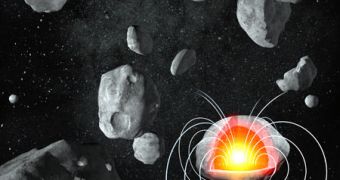A recent study sheds new light on the early years of the solar system, and comes to indicate that its whole evolution must be reconsidered. According to the findings, during the first 3 million years, the system was full of miniature planets, called planetesimals, that sported tiny molten cores and solid crusts, and which ultimately collided in order to form the cosmic bodies of now. Fragments resulted in the aftermath are today's most ancient meteorites, known as achondrites.
A US-Canadian group of experts analyzed a number of such extremely old achondrite meteorites by means of a highly sensitive magnetometer, only to find that they presented traces of an old magnetic field resembling that which marks the Earth's rocks. According to what is now common knowledge, about 4,568 billion years ago, our solar system was undergoing a starting process of condensing from a large primal cloud of dust and gas and, after the first 3 million years, the place was thriving with planetesimals that later began to smash against each other.
This activity caused a vast amount of chondrite meteorites to appear, some of which, 4,565 billion years old, made the object of the study. The fact that they proved to be magnetic changed the long-held belief that the ancient planetesimals were only conglomerates of rubble, showing instead that they were similar to a regular planet, only on a smaller scale (about 160 km in diameter), but still sufficiently large and hot to develop inner metallic molten cores.
“The meteorites, therefore, are essentially magnetic recording tapes,” shares MIT's planetary scientist Benjamin Weiss from Cambridge, the main author of the research. They recorded the activity of an ancient large magnetic field, generated, just like in Earth's case, by a swirling, dynamo-like molten core of a planetesimal. This means that the emergence of such a dynamo does not necessarily require the presence of a large body, as previously thought.

 14 DAY TRIAL //
14 DAY TRIAL //